Finding the Loves of His Life in Laie
Nelson, a BYU–Hawaii IWORK student from Tahiti who works at the Polynesian Cultural Center, says he found the two loves of his life in Laie: his passion for art and graphic design and his wife, Rahei.
December 2021
“You know that phrase ‘starving artist’? I refuse to accept that.” Those are the words of Sam Mangakahia, a BYU–Hawaii alum who is combining artistic talent, cultural values, and entrepreneurship to make a statement and a living.
Sam graduated with a degree in visual arts with an emphasis in graphic design and minors in painting and entrepreneurship. As a student, he paired his studies with a passion for culture and storytelling to start two business ventures: Hāmiora, a company that hand carves custom Polynesian designs into guitars and ukuleles, and Shaka Tribe, a company that creates wooden phone cases and leather journals with Polynesian designs.
Sam’s creativity and entrepreneurial instincts began at home. He was born in Australia to a Māori father who performs cultural songs and dances in schools and a Tanzanian-born English mother who is an artist and entrepreneur. While earning a living for the family, Sam’s parents also imparted a love for art and culture to their children and modeled principles of self-reliance.
“We tagged along and learned alongside of them,” says Sam. “In the process I figured out important principles of business and sustainable approaches to storytelling. . . . What I’ve learned in the home has been very pivotal in my process of creation and sharing my work with others.”
Sam’s education at BYU–Hawaii built on those childhood lessons. “I’ve learned things at BYU–Hawaii that I wasn’t able to learn in the home,” he says. “I really connected with all my professors. They have a really dynamic way of teaching, and I learned a lot. . . . I also visited their offices, sometimes multiple times a day, asking them, ‘What can I do to improve?’ or ‘I have this idea; what should I do?’ It has really helped me to flourish personally and to learn the tricks of the trade.”
Sam originally wanted to attend BYU–Hawaii to play basketball for the Seasiders. However, while he was serving in the Korea Busan Mission, the university announced that it would be discontinuing its athletics program.
When Sam returned home from his mission, he was faced with a decision: play college basketball or attend BYU–Hawaii. He chose basketball and received an athletic scholarship to play for a college in Nebraska. But within a year Sam realized that basketball in Nebraska was not right for him.
Sam again faced a fork in the road. One path led to BYU–Hawaii, and the other path led to BYU in Provo, where he was eligible for an art scholarship. This time, a memory of a visit to Hawaii when he was five years old swayed his decision. “I remember the feeling I had walking around the Polynesian Cultural Center,” he recalls. “There was something about Hawaii that felt like home.”
“We drink from wells that we didn’t dig. I’m the one drinking from the well, and all the donors out there are the wells for us, the next generation. . . . I feel a great responsibility and passion to continue to improve my talents and build the kingdom.”
Going to BYU–Hawaii took some faith for Sam. He couldn’t afford it on his own, and since he had previously attended college in the United States, he was not eligible for the IWORK program. “I thought that maybe I could work hard and really hustle to pay my way through college,” he says. “But then I got here and realized that I didn’t have enough time in my day to make enough money to support myself and stay in school.”
Determined to remain at BYU–Hawaii, Sam petitioned for an exception and was accepted to the IWORK program. He worked at the Polynesian Cultural Center as a performer in the Aotearoa (New Zealand) Village and then as an artisan in the center’s carving shop. The financial aid bridged the gap and enabled him to stay at BYU–Hawaii. “I couldn’t have done it any other way,” he says.
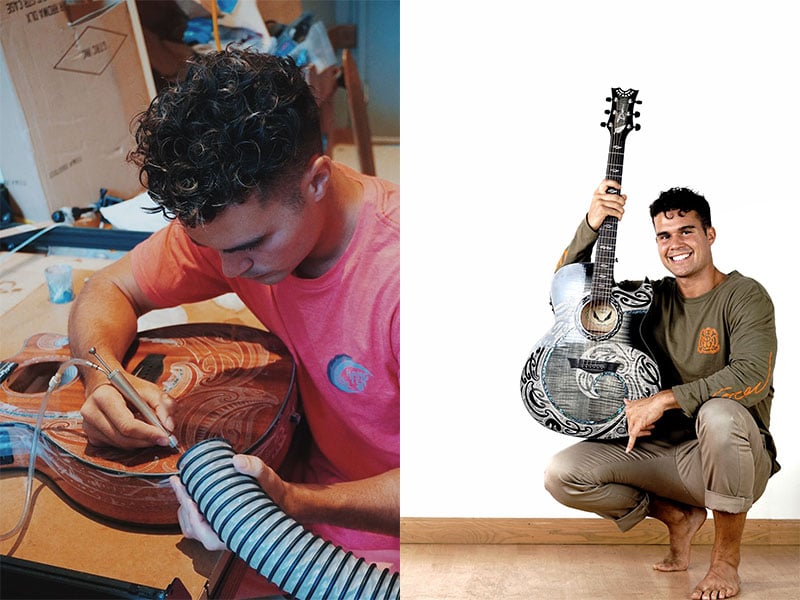 Sam’s first business, Hāmiora, carves custom Polynesian designs into guitars and ukuleles.
Sam’s first business, Hāmiora, carves custom Polynesian designs into guitars and ukuleles.
While simultaneously studying graphic design, painting, and entrepreneurship, Sam was inspired to start a business—not just to generate income but also as a vehicle for sharing meaningful stories and cultural values through his artwork.
“In Polynesia, we didn’t have a written language,” explains Sam. “We shared stories through dance, song, carvings, and tā moko tattoos. Those helped educate us on our lineage and where we came from.”
Sam continues: “I can tell you in Māori who my ancestors are who traveled from Tahiti to New Zealand and 16 generations down from those ancestors to me. When we have this idea of where we’re from, then we know where we connect, we know our purpose, we know our role within a tribe or within the community. I think these designs are a visual way of helping people connect with values.”
Sam entered his first venture, Hāmiora, into BYU–Hawaii’s Ed and Shauna Smith Empower Your Dreams Competition but didn’t place—neither the first nor the second year he entered. Undeterred, Sam continued developing the business, entered the competition a third time, and won first place in his division. The entire process, with all its ups and downs, was an invaluable learning experience. “You refine and really improve your business and your ideas,” he says.
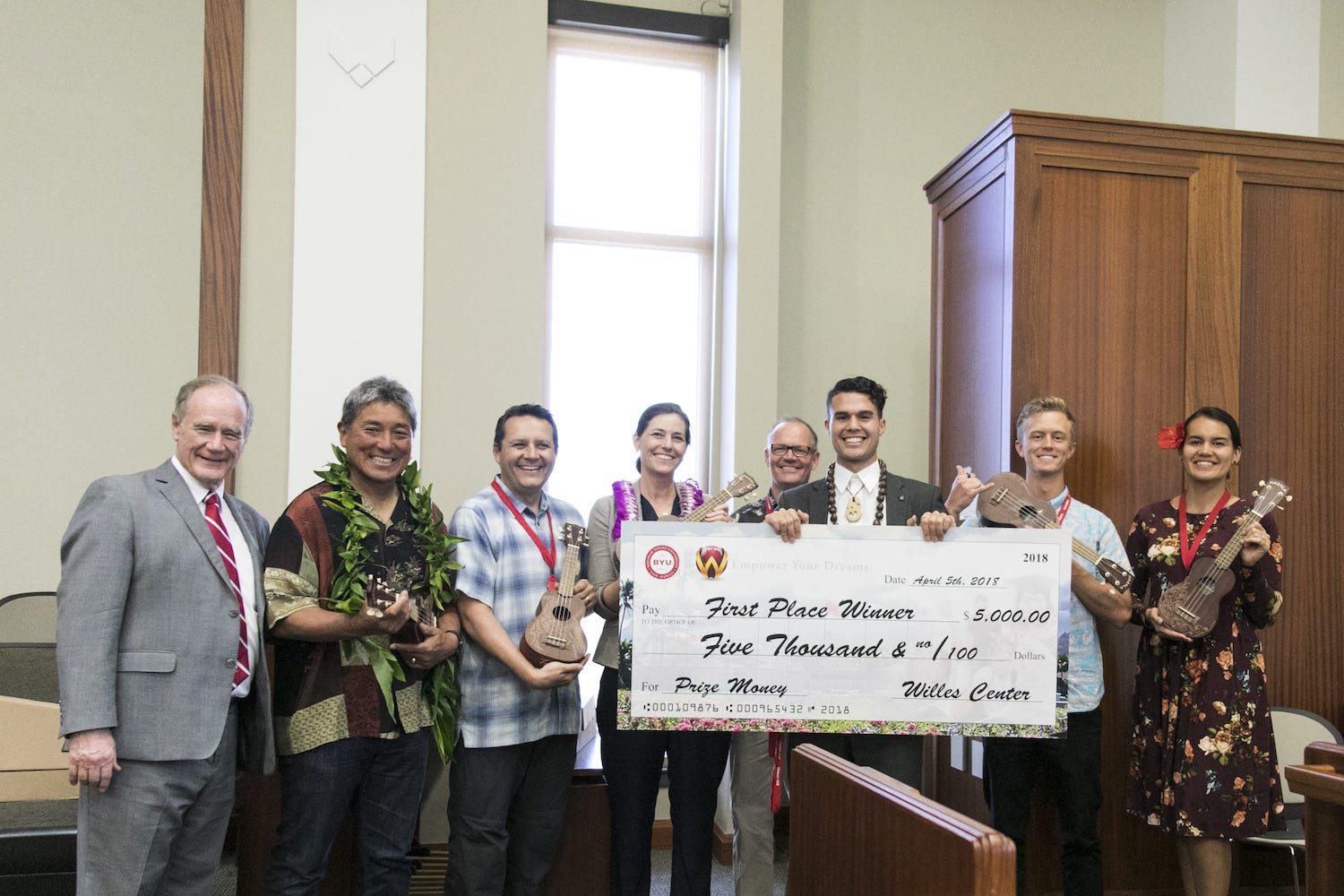 After three attempts, Sam won first place in BYU–Hawaii’s Ed and Shauna Smith Empower Your Dreams Competition with his first business, Hāmiora.
After three attempts, Sam won first place in BYU–Hawaii’s Ed and Shauna Smith Empower Your Dreams Competition with his first business, Hāmiora.
Despite the success of Hāmiora, Sam was not fully satisfied. Hand carving custom designs is very time consuming, and Sam wanted to find a way to scale his artwork more efficiently. “I wanted something I could design once and sell many times,” he says. “It wasn’t so much about the money as it was about reaching more people with these unique stories.”
Sam’s idea to mass-produce his artwork on phone cases and journals required marketing help. So he invited his friend Chalei Crane to join him on the new venture. “I got really excited about the purpose of what we were doing,” says Chalei. “To educate people on cultural identity and the meaning of the designs—that’s why I wanted to be a part of it.”
In January 2020, Sam and Chalei launched Shaka Tribe. “Our vision is to inspire loyalty, strength, and courage through deep-rooted connection,” says Chalei. “Sam has done years of studying Polynesian art and the meaning behind every single line and design. . . . They represent values that any culture and any person can relate to.”
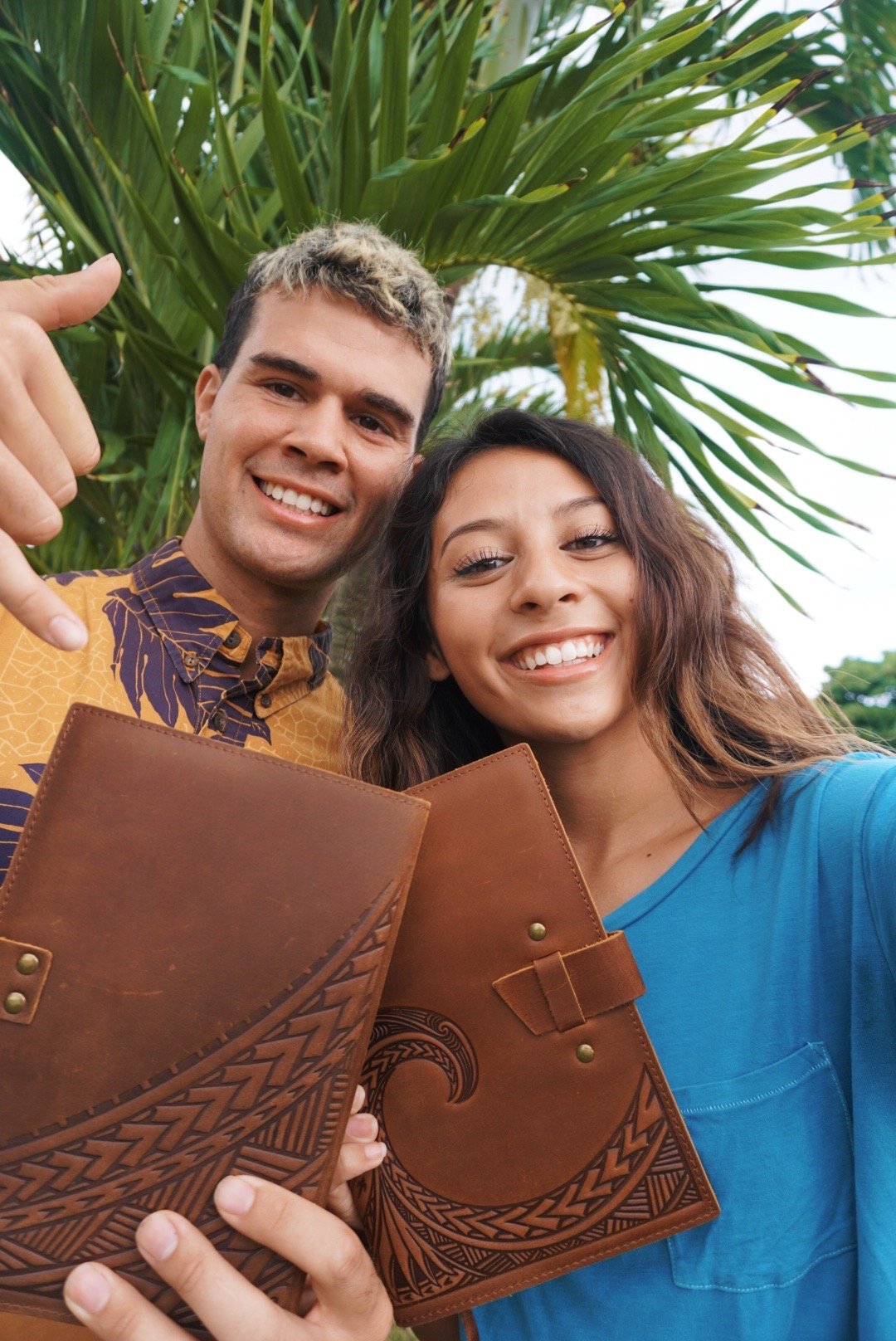 With the help of his friend Chalei Crane, Sam launched a second business venture, Shaka Tribe, to scale his art and reach more people.
With the help of his friend Chalei Crane, Sam launched a second business venture, Shaka Tribe, to scale his art and reach more people.
Since his graduation in December 2020, Sam has continued to grow Hāmiora and Shaka Tribe. And Sam and Chalei, who started as friends and became business partners, are now engaged to be married.
In early 2021, Sam was invited to design and create the presidential medallion for the inauguration of President John S.K. Kauwe III. Another project was to conceptualize the visual identity for Natives Engaged in Alzheimer’s Research, a collaboration between President Kauwe and others that expands treatment and research on Alzheimer’s disease and dementia in Native American, Alaska Native, Native Hawaiian, and other Pacific Islander groups.
Both projects have benefited greatly from Sam’s artistry and his knowledge of and appreciation for cultural symbolism. “The whole process has been very groundbreaking,” says Sam. “And it’s been fun. I love President Kauwe’s vision for the school, and he’s been so open and willing to work with me through the creative process. . . . I wish I could spend every minute of the day working with him.”
Sam’s voyage has been profound. While it began in his childhood, the experiences he’s had at BYU–Hawaii have been a significant part of his growth. And the IWORK program made the journey possible for him.
When asked how he feels about the donors who help fund the IWORK program, Sam says: “We drink from wells that we didn’t dig. I’m the one drinking from the well, and all the donors out there are the wells for us, the next generation. The only way I can show how important it is is by doing something with that gift. I feel a great responsibility and passion to continue to improve my talents and build the kingdom. As a token of my gratitude, I hope I can build wells for people who need to drink.”
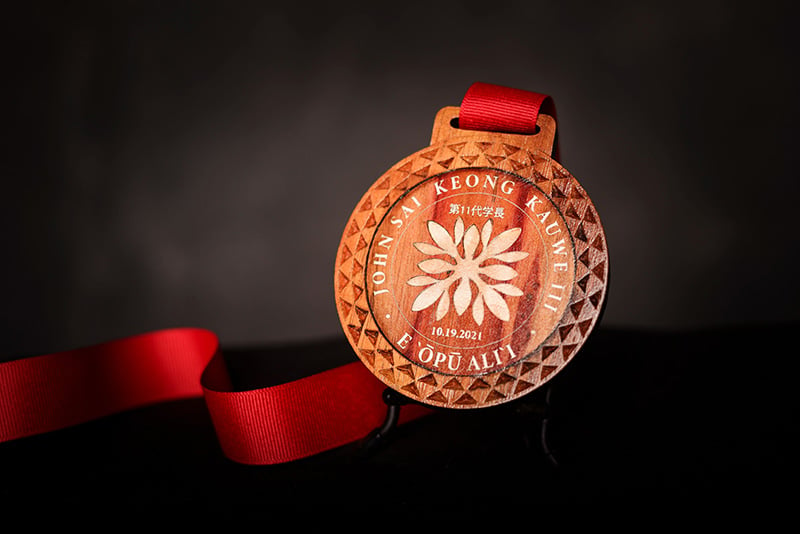 Sam was invited to design and create the presidential medallion for the inauguration of President John S.K. Kauwe III.
Sam was invited to design and create the presidential medallion for the inauguration of President John S.K. Kauwe III.
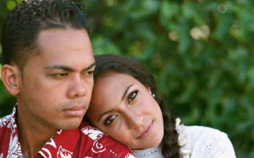
Nelson, a BYU–Hawaii IWORK student from Tahiti who works at the Polynesian Cultural Center, says he found the two loves of his life in Laie: his passion for art and graphic design and his wife, Rahei.
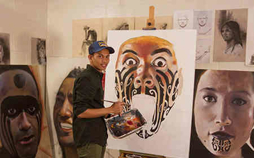
RJ, a BYU-Hawaii IWORK student from the Philippines, went from imitating artwork from Church magazines to studying art in Paris and New York thanks to scholarships and internships.
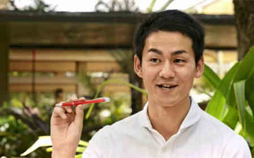
Kazu, a BYU-Hawaii student from Japan, struggled to learn English as a high school student. His desire to attend BYU–Hawaii motivated him to study hard, and he finished in the top of his class. Now he is enjoying opportunities he didn’t imagine were possible.